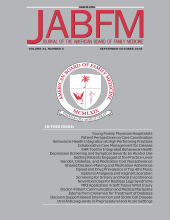Abstract
Background: The purpose of this study was to characterize the content of family physician (FP) clinic encounters, and to count the number of visits in which the FPs addressed issues not explicitly reportable by 99211 to 99215 and 99354 Current Procedural Terminology (CPT) codes with current reimbursement methods and based on examples provided in the CPT manual.
Methods: The data collection instrument was modeled on the National Ambulatory Medical Care Survey. Trained assistants directly observed every other FP-patient encounter and recorded every patient concern, issue addressed by the physician (including care barriers related to health care systems and social determinants), and treatment ordered in clinics affiliated with 10 residencies of the Residency Research Network of Texas. A visit was deemed to include physician work that was not explicitly reportable if the number or nature of issues addressed exceeded the definitions or examples for 99205/99215 or 99214 + 99354 or a preventive service code, included the physician addressing health care system or social determinant issues, or included the care of a family member.
Results: In 982 physician-patient encounters, patients raised 517 different reasons for visit (total, 5278; mean, 5.4 per visit; range, 1 to 16) and the FPs addressed 509 different issues (total issues, 3587; mean, 3.7 per visit; range, 1 to 10). FPs managed 425 different medications, 18 supplements, and 11 devices. A mean of 3.9 chronic medications were continued per visit (range, 0 to 21) and 4.6 total medications were managed (range, 0 to 22). In 592 (60.3%) of the visits the FPs did work that was not explicitly reportable with available CPT codes: 582 (59.3%) addressed more numerous issues than explicitly reportable, 64 (6.5%) addressed system barriers, and 13 (1.3%) addressed concerns for other family members.
Conclusions and relevance: FPs perform cognitive work in a majority of their patient encounters that are not explicitly reportable, either by being higher than the CPT example number of diagnoses per code or the type of problems addressed, which has implications for the care of complex multi-morbid patients and the growth of the primary care workforce. To address these limitations, either the CPT codes and their associated rules should be updated to reflect the realities of family physicians’ practices or new billing and coding approaches should be developed.







